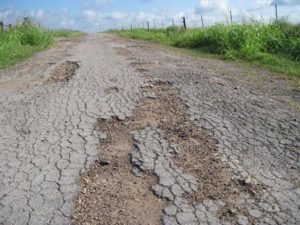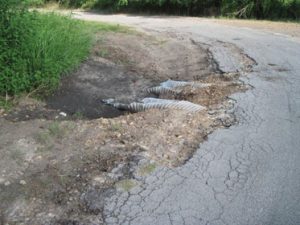Counties Seek Solutions as Roadways Crumble
It’s not every day that county government makes the Wall Street Journal. However, on July 27 one of the country’s largest newspapers shared with its readership the emerging plight of Texas counties both blessed and challenged by the oil and gas industry. DeWitt County Judge Daryl Fowler was quoted in the article titled, “Drilling Strains Rural Roads: Counties Struggle to Repair Damage From Heavy Trucks in Energy Boom.”
Some three weeks earlier Fowler penned a press release of his own with the following lead: “The Eagle Ford Shale Play in South Texas could be the most significant economic development in Texas history. Lying under at least 24 Texas counties and containing liquid hydrocarbons as well as natural gas, it is bringing new life to many declining towns. It is a mixed blessing, which manifests itself in similar ways all across the Play. DeWitt County is experiencing the rebirth firsthand: an exploding tax base stemming from unprecedented economic activity, and balanced by what was until now, unquantifiable road damage.”
Months earlier in March 2012 Fowler was appointed to the Task Force on Texas’ Energy Sector Roadway Needs, established by the Texas Department of Transportation and comprised of representatives from the Department of Public Safety, Department of Motor Vehicles, Railroad Commission of Texas, Texas Commission on Environmental Quality, Texas counties, and the energy and trucking sectors.
Normally speaking, only disaster-related stories such as hurricanes or wildfires warrant national headlines or prompt the state’s formation of special response groups. So what makes this particular topic worthy of such attention? Perhaps the following talking points gleaned from one county’s unfolding experience can explain:
- Texas counties are responsible for the county road system and other county-maintained infrastructure.
- Counties receive funding from the state in the form of Overweight Axle Fees and gasoline tax remittances. In the fiscal year that ended September 2011, DeWitt County received $112,000 from the Office of the Texas Comptroller in Overweight Axle Fees and gasoline tax remittances.
- DeWitt County sits in the heart of the Eagle Ford Shale Play. The consequential damage to county roads and bridges and future road-related needs necessary to support the burgeoning industry are outpacing the increased revenue stream.
- According to a study conducted on the Eagle Ford Shale by James M. Sassin of Fugro Consultants, 1,184 loaded trucks are used to bring one gas well into production. One truck can cause more damage than 1,000 vehicles. One well operation requires 353 loaded trucks per year to maintain the well, and an additional 997 loaded trucks every five years to re-fracture the well. Translate this into car miles, and the operation equals 8 million cars plus an additional 2 million cars per year to maintain.
- DeWitt County hired Naismith Engineering Inc. to conduct a study of the county’s road system. Naismith evaluated 394 miles of DeWitt County roads and assigned costs per mile based upon drilling activity expectations. The cost of providing a road system suitable for the public and the industry in DeWitt County could tally as much as $432 million. In addition, the study estimated the county’s tab for drilling-related road damage at more than $100 million.
a) According to the Naismith study, the county road system in DeWitt County consists of pavements that usually contain 4 inches to 6 inches of base material over soils with fair strength, surfaced with an asphalt seal coat. These roads were intended to carry local, light traffic.
b) Two drilling companies, BHP Billiton and Pioneer Natural Resources, are contributing $8,000 per well bore on a voluntary basis. These companies signed voluntary road use agreements with the county in 2010 and 2011 which renew annually. Unless there are extenuating circumstances or limitations in the agreement, the $8,000 donation is used for road maintenance, Fowler said. The county divides the receipts among the precincts where the new wells are located. As of press time, the county had received some $2 million in cumulative voluntary contributions.
c) Last year DeWitt County adopted the highest tax rate it could set without triggering a rollback election and devoted the additional revenue to road and bridge funds. This added some $524,000 to the county’s road repair funds.
d) DeWitt County’s effective tax rate has fallen from .65192 to .32617 in just two years, Fowler reported, and the rollback rate will only yield a $572,308 tax levy increase. “Therefore, we are contemplating a bold move to hold our maintenance and operating tax rate at this year’s level (.44919/100) and risk a rollback election, so that we can raise an additional $4.5 million for our road and bridge needs,” he continued. “The newspaper headlines and the notices required by Truth-In-Taxation will be awful: ‘County Proposes 62 Percent Tax Increase.’ ”
e) DeWitt County has an Over Age 65 and Disabled Homestead Tax Freeze. “Therefore, 40 percent of our homesteads will experience drops in tax bills in the good times, but will not experience an increase when the mineral values begin to fall,” the judge detailed. “At some future point in time, the rise in the tax rate and tax levy will be borne by businesses and the people under age 65 with homesteads.”
“Rural counties do not have limitless income potential just because the tax base is exploding,” the judge underscored. “Right now, taxes and donations are the only two viable options available to fix county roads which may require up to $80,000 per mile to repair and up to $1.9 million per mile to rebuild.”
Possible Solutions
Fowler, a county representative on the state’s task force, said he is hopeful the cross-section of stakeholders can agree on solutions to present to the Legislature during the upcoming session. In the meantime, the judge is asking his committee counterparts to consider the Severance Tax. This tax is currently allocated into the Permanent School Fund and the Economic Stabilization Fund (the “Rainy Day Fund”), while the Farm-to-Market System and county road systems are suffering unlimited damages from the economic activity that creates the Severance Tax revenue, Fowler emphasized.
Information collected from the state comptroller by Fowler indicates that 24 counties in the Eagle Ford Shale Play are responsible for more than $323 million of Severance Tax receipts in the fiscal year that ended last September. Production from wells in DeWitt County yielded $57.5 million of the total.
“This $57.5 million is hard to reconcile with the $112,000 DeWitt County received from the comptroller for Overweight Axle Fees and gasoline tax remittances in the same period,” Fowler asserted. Rather, “a portion of the Severance Tax dollars should stay in the producing county.”
Fowler plans to testify before the Texas Legislature regarding this proposal.
“I want to encourage other commissioners court members to come to Austin and personally present their own facts, figures and suggestions,” he declared. “We need ‘boots on the ground’ at the Capitol.”
San Patricio County requires any business entity, individual, or group doing any drilling, production or development activities to obtain a permit from its Flood Plain Management Office. In addition, heavy equipment users including operators in the business of drilling gas or oil wells who use county roads for the purpose of performing their activities are required to post a cash or surety bond to cover the costs of any damage to the roads caused by the development activity, said San Patricio County Commissioner Fred Nardini.
The order adopted by the San Patricio County Commissioners Court requires a cash or surety bond be provided in the amount of $25,000, or a blanket bond of $50,000. The blanket bond is to cover an entire precinct in those cases where work is being done in various areas of a precinct. The purpose of the bond is to “cover any and all damage to the roads or other rights of way, including damage to sidewalks, curbs, medians, street signs and street lights. Ordinary wear and tear are excluded from this policy.” If no road damage is reported, the bond will be refunded to the operator. But if road damage is reported, “the damage will be repaired by the county and the actual cost of the repair work deducted from the bond held.”
If the entity has not secured the necessary road bond, the Flood Plain Management Office will deny the development permit until the bond is secured. Once obtained, the permit must be posted at the work site, and any development without the permit can be shut down by county law enforcement officers. This system has been in place for several years and has yet to be challenged in a court of law.
Johnson County has been wrestling with road issues for several years, thanks to its position atop the natural gas-rich Barnett Shale. During high-production times, larger companies agreed to fund repairs, once officials produced before-and-after assessments, said Johnson County Judge Roger Harmon, who serves on the state’s task force. However, drilling has slowed in Johnson County due to the decline in natural gas prices.
As counties continue to forge their own solutions, the state-formed task force is planning its next meeting. Texas counties are represented by Fowler and Harmon, along with Andrews County Judge Richard Dolgener, Zavala County Judge Joe Luna, and Midland County Commissioner Robin Donnelly.
As of press time, the group was set to gather in Midland County in late August to fulfill its mission:
- Continue research, data gathering and sharing.
- Identify future energy developments.
- Strategize use of new technology.
- Discuss potential legislative issues.
- Develop funding strategies.
- Routinely monitor, evaluate and revise plans.
County officials have addressed the issue throughout the spring and summer at their regional educational conferences and will continue to do so at upcoming meetings. In fact, a course on “Strategic Planning: Financial Assistance for County Roads” is on the agenda for the upcoming County Judges and Commissioners Association of Texas Annual Conference Oct. 1-4 in San Marcos.
“The County Judges and Commissioners Association of Texas (CJCAT) has submitted a request for immediate funding of a County Road Repair Program to the Legislative Budget Board and the Texas Transportation Commission,” stated Jim Allison, general counsel of the CJCAT. “The Association will also be seeking permanent funding for county roads during the regular legislative session.”
All three CJCAT sub-regions have passed related resolutions, the latest by the South Texas County Judges and Commissioners Association on June 20 as follows:
WHEREAS, Texas is currently experiencing record oil and gas drilling activity; and
WHEREAS, new drilling and exploration technology has tremendously increased the oil and gas truck traffic on county roads; and
WHEREAS, this truck traffic has literally destroyed many county roads, creating a safety hazard for the public; and
WHEREAS, Texas counties are dependent upon the property tax and have no source of funding to repair the damage from this oil and gas truck traffic; and
WHEREAS, immediate assistance is required to protect the public and prevent further deterioration of the county roads;
NOW, THEREFORE, BE IT RESOLVED that the South Texas County Judges and Commissioners Association requests that the Texas Transportation Commission and the Legislative Budget Board convene in emergency session to provide assistance to Texas counties to repair and rehabilitate county roads.
County Progress will continue to report on proposed solutions as they unfold. We also invite you to send us your feedback, ideas, model road-use agreements, and photos from your county depicting road and bridge damage. Perhaps you have just the program or procedure that will help one of your fellow counties.
In the midst of detailing the down side of drilling, it’s important to note that county officials have not turned a blind eye to the benefits of the boom; in fact, some rural areas, seemingly dwindling and dormant, have come to life and are now teeming with growth, job opportunities, and community improvements, thanks to the new revenue stream afforded by oil and gas. Nor can judges and commissioners turn a blind eye to crumbling roads, some of which are literally disintegrating, creating dangerous drop-offs and narrow stretches.
With drilling activity expected to last several decades, county officials have no choice but to plan for the future, ensuring their citizens are kept safe and secure, thus enabling them to enjoy the plus side of living in a boom town.
– By Julie Anderson


















